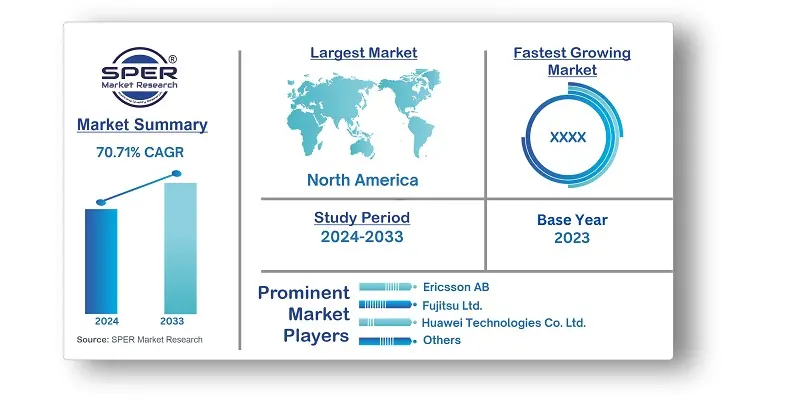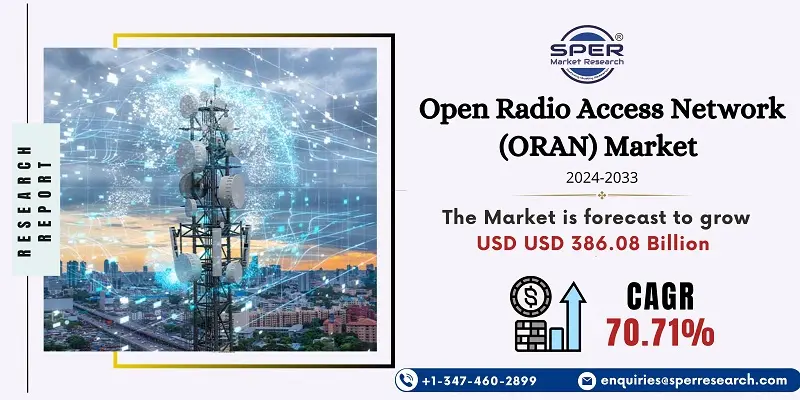
Open Radio Access Network Market Growth, Size, Trends, Share, Revenue and Future Outlook
Open Radio Access Network (ORAN) Market Size- By Component, By Unit, By Network, By Frequency- Regional outlook, Competitive Strategies and Segment Forecast to 2033
| Published: Aug-2024 | Report ID: IACT24148 | Pages: 1 - 230 | Formats*: |
| Category : Information & Communications Technology | |||
- November 2022; Samsung Hardware Co., Ltd. came into a coordinated effort with NTT DOCOMO, Japan's driving portable administrator. Under this joint effort, Samsung Hardware Co., Ltd. would convey various 5G radios to help NTT DOCOMO's Open Radio Access Organization (Open RAN) extension. Moreover, Samsung Gadgets Co., Ltd. would have the option to give a smooth encounter to customers and foster further business valuable open doors.
- December 2022; Ericsson Stomach Muscle came into cooperation with Singtel Optus Pty Restricted, an Australian media communications organization settled in Macquarie Park, New South Ribs, Australia. Under this coordinated effort, the associations would convey Australia's most recent energy-productive radio access organization (RAN) site at Optus' Moore bank site in Sydney, New South Ribs. Besides, this is an essential step for Ericsson Stomach Muscle toward its central goal to be Net Zero across their worth chain by 2040. This would additionally diminish outflows by half in their portfolio being used and store network by 2030.


| Report Metric | Details |
| Market size available for years | 2020-2033 |
| Base year considered | 2023 |
| Forecast period | 2024-2033 |
| Segments covered | By Component, By Unit, By Network, By Frequency |
| Regions covered | North America, Europe, Asia Pacific, Latin America, Middle East & Africa |
| Companies Covered | Ericsson AB, Fujitsu Ltd., Huawei Technologies Co. Ltd., Mavenir Systems Inc., NEC Corporation, Nokia Corporation, Parallel Wireless Inc., Radisys Corporation, Samsung Electronics Co. Ltd., and ZTE Corporation. |
- Mobile Network Operators (MNOs)
- Telecom Equipment Manufacturers
- Network Infrastructure Providers
- Service Providers and System Integrators
- Enterprises and Large Businesses
- Government and Regulatory Bodies
| By Component: |
|
| By Unit: |
|
| By Network: |
|
| By Frequency: |
|
- Global Open Radio Access Network (ORAN) Market Size (FY’2024-FY’2033)
- Overview of Global Open Radio Access Network (ORAN) Market
- Segmentation of Global Open Radio Access Network (ORAN) Market by Component (Hardware, Software, Services (Consulting, Deployment and Implementation, Support and Maintenance))
- Segmentation of Global Open Radio Access Network (ORAN) Market by Unit (Application Programming Interface (Radio Unit, Distributed Unit, Centralized Unit
- Segmentation of Global Open Radio Access Network (ORAN) Market by Network (2G/3G, 4G, 5G)
- Segmentation of Global Open Radio Access Network (ORAN) Market by Frequency (Sub-6 GHz, mm Wave)
- Statistical Snap of Global Open Radio Access Network (ORAN) Market
- Expansion Analysis of Global Open Radio Access Network (ORAN) Market
- Problems and Obstacles in Global Open Radio Access Network (ORAN) Market
- Competitive Landscape in the Global Open Radio Access Network (ORAN) Market
- Impact of COVID-19 and Demonetization on Global Open Radio Access Network (ORAN) Market
- Details on Current Investment in Global Open Radio Access Network (ORAN) Market
- Competitive Analysis of Global Open Radio Access Network (ORAN) Market
- Prominent Players in the Global Open Radio Access Network (ORAN) Market
- SWOT Analysis of Global Open Radio Access Network (ORAN) Market
- Global Open Radio Access Network (ORAN) Market Future Outlook and Projections (FY’2024-FY’2033)
- Recommendations from Analyst
1.1. Scope of the report1.2. Market segment analysis
2.1. Research data source2.1.1. Secondary Data2.1.2. Primary Data2.1.3. SPER’s internal database2.1.4. Premium insight from KOL’s2.2. Market size estimation2.2.1. Top-down and Bottom-up approach2.3. Data triangulation
4.1. Driver, Restraint, Opportunity, and Challenges analysis4.1.1. Drivers4.1.2. Restraints4.1.3. Opportunities4.1.4. Challenges4.2. COVID-19 Impacts of the Global Open Radio Access Network (ORAN) Market
5.1. SWOT Analysis5.1.1. Strengths5.1.2. Weaknesses5.1.3. Opportunities5.1.4. Threats5.2. PESTEL Analysis5.2.1. Political Landscape5.2.2. Economic Landscape5.2.3. Social Landscape5.2.4. Technological Landscape5.2.5. Environmental Landscape5.2.6. Legal Landscape5.3. PORTER’s Five Forces5.3.1. Bargaining power of suppliers5.3.2. Bargaining power of buyers5.3.3. Threat of Substitute5.3.4. Threat of new entrant5.3.5. Competitive rivalry5.4. Heat Map Analysis
6.1. Global Open Radio Access Network (ORAN) Market Manufacturing Base Distribution, Sales Area, Product Type6.2. Mergers & Acquisitions, Partnerships, Product Launch, and Collaboration in Global Open Radio Access Network (ORAN) Market
7.1. Global Open Radio Access Network (ORAN) Market Size, Share and Forecast, By Component, 2020-20267.2. Global Open Radio Access Network (ORAN) Market Size, Share and Forecast, By Component, 2027-20337.3. Hardware7.4. Software7.5. Services (Consulting, Deployment and Implementation, Support and Maintenance)
8.1. Global Open Radio Access Network (ORAN) Market Size, Share and Forecast, By Unit, 2020-20268.2. Global Open Radio Access Network (ORAN) Market Size, Share and Forecast, By Unit, 2027-20338.3. Radio Unit8.4. Distributed Unit8.5. Centralized Unit
9.1. Global Open Radio Access Network (ORAN) Market Size, Share and Forecast, By Network, 2020-20269.2. Global Open Radio Access Network (ORAN) Market Size, Share and Forecast, By Network, 2027-20339.3. 2G/3G9.4. 4G9.5. 5G
10.1. Global Open Radio Access Network (ORAN) Market Size, Share and Forecast, By Frequency, 2020-202610.2. Global Open Radio Access Network (ORAN) Market Size, Share and Forecast, By Frequency, 2027-203310.3. Sub-6 GHz10.4. mm Wave
11.1. Global Open Radio Access Network (ORAN) Market Size and Market Share
12.1. Global Open Radio Access Network (ORAN) Market Size and Market Share By Region (2020-2026)12.2. Global Open Radio Access Network (ORAN) Market Size and Market Share By Region (2027-2033)12.3. Asia-Pacific
12.3.1. Australia
12.3.2. China12.3.3. India12.3.4. Japan12.3.5. South Korea12.3.6. Rest of Asia-Pacific
12.4. Europe
12.4.1. France12.4.2. Germany12.4.3. Italy12.4.4. Spain12.4.5. United Kingdom12.4.6. Rest of Europe
12.5. Middle East and Africa
12.5.1. Kingdom of Saudi Arabia12.5.2. United Arab Emirates12.5.3. Qatar12.5.4. South Africa12.5.5. Egypt12.5.6. Morocco12.5.7. Nigeria12.5.8. Rest of Middle-East and Africa
12.6. North America
12.6.1. Canada12.6.2. Mexico12.6.3. United States
12.7. Latin America
12.7.1. Argentina12.7.2. Brazil12.7.3. Rest of Latin America
13.1. Ericsson AB13.1.1. Company details13.1.2. Financial outlook13.1.3. Product summary13.1.4. Recent developments13.2. Fujitsu Ltd.13.2.1. Company details13.2.2. Financial outlook13.2.3. Product summary13.2.4. Recent developments13.3. Huawei Technologies Co. Ltd.13.3.1. Company details13.3.2. Financial outlook13.3.3. Product summary13.3.4. Recent developments13.4. Mavenir Systems Inc.13.4.1. Company details13.4.2. Financial outlook13.4.3. Product summary13.4.4. Recent developments13.5. NEC Corporation13.5.1. Company details13.5.2. Financial outlook13.5.3. Product summary13.5.4. Recent developments13.6. Nokia Corporation13.6.1. Company details13.6.2. Financial outlook13.6.3. Product summary13.6.4. Recent developments13.7. Parallel Wireless Inc.13.7.1. Company details13.7.2. Financial outlook13.7.3. Product summary13.7.4. Recent developments13.8. Radisys Corporation13.8.1. Company details13.8.2. Financial outlook13.8.3. Product summary13.8.4. Recent developments13.9. Samsung Electronics Co. Ltd.13.9.1. Company details13.9.2. Financial outlook13.9.3. Product summary13.9.4. Recent developments13.10. ZTE Corporation13.10.1. Company details13.10.2. Financial outlook13.10.3. Product summary13.10.4. Recent developments
SPER Market Research’s methodology uses great emphasis on primary research to ensure that the market intelligence insights are up to date, reliable and accurate. Primary interviews are done with players involved in each phase of a supply chain to analyze the market forecasting. The secondary research method is used to help you fully understand how the future markets and the spending patterns look likes.
The report is based on in-depth qualitative and quantitative analysis of the Product Market. The quantitative analysis involves the application of various projection and sampling techniques. The qualitative analysis involves primary interviews, surveys, and vendor briefings. The data gathered as a result of these processes are validated through experts opinion. Our research methodology entails an ideal mixture of primary and secondary initiatives.



Frequently Asked Questions About This Report
PLACE AN ORDER
Year End Discount
Sample Report
Pre-Purchase Inquiry
NEED CUSTOMIZATION?
Request CustomizationCALL OR EMAIL US
100% Secure Payment






Related Reports
Our Global Clients
Our data-driven insights have influenced the strategy of 200+ reputed companies across the globe.




















